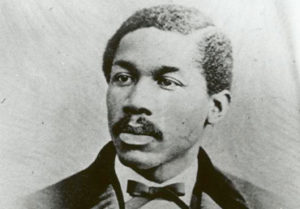
*Octavius Catto was born on this date in 1839. He was a Black educator, Baseball player, author, and abolitionist.
Octavius Valentine Catto was born free in Charleston, South Carolina. His mother, Sarah Isabella Cain, was free and a member of the city's prominent mixed-race DeReef family, which had been free for decades and belonged to the Brown Fellowship Society as a mark of their status. His father, William T. Catto, had been a slave millwright in South Carolina and gained his freedom. He was ordained as a Presbyterian minister before taking his family north, first to Baltimore and then to Philadelphia, where they settled. Pennsylvania abolished slavery before the Revolutionary War ended. William T. Catto was a founding member of the Banneker Institute in that city and author of "A Semi-Centenary Discourse," a history of the First African Presbyterian Church in Philadelphia.
In Philadelphia, young Catto began his education at the segregated Vaux Primary School and Lombard Grammar School. In 1853, he entered the all-white Allentown Academy in Allentown, New Jersey, located east of the Delaware River. In 1854, when his family returned to Philadelphia, he became a student at that city's Institute for Colored Youth (ICY). Managed by the Society of Friends (Quakers), their curriculum included the classical study of Latin, Greek, geometry, and trigonometry. While a student at ICY, Catto presented papers and participated in scholarly discussions at "a young men's instruction society."
ICY was eventually renamed the Banneker Institute. Catto graduated from ICY in 1858 and did a year of post-graduate study, including private tutoring in both Greek and Latin, in Washington, D. C. In 1859, he returned to Philadelphia, where he was elected full member, Recording Secretary, and teacher of English and mathematics of the Banneker Institute. On May 10, 1864, Catto delivered their commencement address, which gave a historical synopsis of the school. In addition, Catto's address touched on the issue of the potential insensitivity of white teachers toward the needs and interests of black students.
Catto was active on the sporting field. Like many other young men of Philadelphia, both white and black, Catto began playing cricket while in school. Later he took up the American sport of baseball. Following the Civil War, he helped establish Philadelphia as a major hub of what became Negro league baseball. Along with Jacob C. White, Jr., he ran the Pythian Base Ball Club of Philadelphia. The Pythians had an undefeated season in 1867. Following the 1867 season, Catto, with support from players from the white Athletic Base Ball Club, applied for the Pythians' admission into the newly formed Pennsylvania Base Ball Association. As it became clear they would lose any vote by the Association, they withdrew their application. In 1869 the Pythians challenged various white baseball teams in Philadelphia to games. The Olympic Ball Club accepted the challenge. The first match game between black and white baseball teams took place on September 4, 1869. The Pythians' lost 44 to 23. (New York Times, September 5, 1869).
On Election Day, October 10, 1871, Catto taught in Philadelphia. Fights broke out in the city between black and white voters, as the elections were high in tension and parties reflected racial opposition. Black voters, mostly Republican, faced intimidation and violence from white voters, especially ethnic Irish, who were partisans of the city's Democratic machine. Irish immigrants had entered the city in great numbers during and after the Great Famine of the 1840s; they competed with free blacks for jobs and housing.
City police were called on to quell the violence. Instead, often ethnic Irish themselves exacerbated the problems, using their power to prevent black citizens from voting. Lieutenant Haggerty was later arrested for encouraging police under his command to keep African Americans from voting. On his way to vote, whites harassed Catto. Police reports indicate that he had purchased a revolver for protection. At the intersection of Ninth and South streets, Catto was accosted by Frank Kelly, an ethnic Irish man, who shot him three times. Catto died of his wounds. The city inquest could not determine if Catto had pulled his gun.
He became a martyr to racism, as he was shot and killed in election-day violence in Philadelphia, where ethnic Irish of the Democratic Party, which was anti-Reconstruction and had opposed black suffrage, attacked black men to prevent their voting for Republican candidates. Catto's military funeral was at Lebanon Cemetery in Passyunk Square. The murder of Catto, an important leader, and violence throughout the election, coupled with the resurgence of the anti-Reconstruction Democratic Party in the city, marked the beginning of a decline in black militancy in 19th-century Philadelphia. Later, after the cemetery was closed down, Catto's remains were reinterred at Eden Cemetery in Collingdale, Pennsylvania.